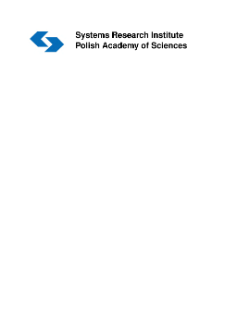- Search in all Repository
- Literature and maps
- Archeology
- Mills database
- Natural sciences
Advanced search
Advanced search
Advanced search
Advanced search
Advanced search

Object
Title: New developments in fuzzy sets, intuitionistic fuzzy sets, generalized nets and related topics. Volume II: applications * Fuzzy decision making in toxoplasmosis medication
Subtitle:
Książka = Book ; KS/4/2012/P15
Publisher:
Instytut Badań Systemowych. Polska Akademia Nauk ; Systems Research Institute. Polish Academy of Sciences
Place of publishing:
Description:
[5], 185-200 pages ; 21 cm ; Bibliography p. 198-200
Type of object:
Abstract:
Theoretical fuzzy decision-making models mostly developed by Zadeh, Bellman, Jain and Yager can be adopted as useful tools to estimation of the total effectiveness-utility of a drug when appreciating its positive influence on a collection of symptoms characteristic of a considered diagnosis. The expected effectiveness of the medicine is evaluated by a physician as a verbal expression for each distinct symptom. By converting the words at first to fuzzy sets and then numbers we can regard the effectiveness structures as entries of a utility matrix that constitutes the common basic component of all methods. We involve the matrix in a number of computations due to different decision algorithms to obtain a sequence of tested medicines in conformity with their abilities to soothe the unfavorable impact of symptoms. An adjustment of the large spectrum of applied fuzzy decision-making models to the extraction of the best medicines provides us with some deviations in obtained results but we are thus capable to select this method whose effects closest converge to the physicians’ judgments and expectations. In the current paper we apply fuzzy decision making algorithms to rank medicines in multifocal toxoplasmosis.
Relation:
Detailed Resource Type:
Resource Identifier:
Source:
Language:
Language of abstract:
Rights:
Creative Commons Attribution BY 4.0 license
Terms of use:
Copyright-protected material. [CC BY 4.0] May be used within the scope specified in Creative Commons Attribution BY 4.0 license, full text available at: ; -
Digitizing institution:
Systems Research Institute of the Polish Academy of Sciences
Original in:
Library of Systems Research Institute PAS
Projects co-financed by:
Access:
Object collections:
- Digital Repository of Scientific Institutes > Partners' collections > Systems Research Institute PAS > Books
- Digital Repository of Scientific Institutes > Literature > Books/Chapters
Last modified:
Oct 15, 2021
In our library since:
Aug 18, 2021
Number of object content downloads / hits:
36
All available object's versions:
https://rcin.org.pl./publication/242609
Show description in RDF format:
Show description in RDFa format:
Show description in OAI-PMH format:
Objects Similar
Rakus-Andersson, Elisabeth
Forssell, Henrik Rakus-Andersson, Elisabeth

 INSTYTUT ARCHEOLOGII I ETNOLOGII POLSKIEJ AKADEMII NAUK
INSTYTUT ARCHEOLOGII I ETNOLOGII POLSKIEJ AKADEMII NAUK
 INSTYTUT BADAŃ LITERACKICH POLSKIEJ AKADEMII NAUK
INSTYTUT BADAŃ LITERACKICH POLSKIEJ AKADEMII NAUK
 INSTYTUT BADAWCZY LEŚNICTWA
INSTYTUT BADAWCZY LEŚNICTWA
 INSTYTUT BIOLOGII DOŚWIADCZALNEJ IM. MARCELEGO NENCKIEGO POLSKIEJ AKADEMII NAUK
INSTYTUT BIOLOGII DOŚWIADCZALNEJ IM. MARCELEGO NENCKIEGO POLSKIEJ AKADEMII NAUK
 INSTYTUT BIOLOGII SSAKÓW POLSKIEJ AKADEMII NAUK
INSTYTUT BIOLOGII SSAKÓW POLSKIEJ AKADEMII NAUK
 INSTYTUT CHEMII FIZYCZNEJ PAN
INSTYTUT CHEMII FIZYCZNEJ PAN
 INSTYTUT CHEMII ORGANICZNEJ PAN
INSTYTUT CHEMII ORGANICZNEJ PAN
 INSTYTUT FILOZOFII I SOCJOLOGII PAN
INSTYTUT FILOZOFII I SOCJOLOGII PAN
 INSTYTUT GEOGRAFII I PRZESTRZENNEGO ZAGOSPODAROWANIA PAN
INSTYTUT GEOGRAFII I PRZESTRZENNEGO ZAGOSPODAROWANIA PAN
 INSTYTUT HISTORII im. TADEUSZA MANTEUFFLA POLSKIEJ AKADEMII NAUK
INSTYTUT HISTORII im. TADEUSZA MANTEUFFLA POLSKIEJ AKADEMII NAUK
 INSTYTUT JĘZYKA POLSKIEGO POLSKIEJ AKADEMII NAUK
INSTYTUT JĘZYKA POLSKIEGO POLSKIEJ AKADEMII NAUK
 INSTYTUT MATEMATYCZNY PAN
INSTYTUT MATEMATYCZNY PAN
 INSTYTUT MEDYCYNY DOŚWIADCZALNEJ I KLINICZNEJ IM.MIROSŁAWA MOSSAKOWSKIEGO POLSKIEJ AKADEMII NAUK
INSTYTUT MEDYCYNY DOŚWIADCZALNEJ I KLINICZNEJ IM.MIROSŁAWA MOSSAKOWSKIEGO POLSKIEJ AKADEMII NAUK
 INSTYTUT PODSTAWOWYCH PROBLEMÓW TECHNIKI PAN
INSTYTUT PODSTAWOWYCH PROBLEMÓW TECHNIKI PAN
 INSTYTUT SLAWISTYKI PAN
INSTYTUT SLAWISTYKI PAN
 SIEĆ BADAWCZA ŁUKASIEWICZ - INSTYTUT TECHNOLOGII MATERIAŁÓW ELEKTRONICZNYCH
SIEĆ BADAWCZA ŁUKASIEWICZ - INSTYTUT TECHNOLOGII MATERIAŁÓW ELEKTRONICZNYCH
 MUZEUM I INSTYTUT ZOOLOGII POLSKIEJ AKADEMII NAUK
MUZEUM I INSTYTUT ZOOLOGII POLSKIEJ AKADEMII NAUK
 INSTYTUT BADAŃ SYSTEMOWYCH PAN
INSTYTUT BADAŃ SYSTEMOWYCH PAN
 INSTYTUT BOTANIKI IM. WŁADYSŁAWA SZAFERA POLSKIEJ AKADEMII NAUK
INSTYTUT BOTANIKI IM. WŁADYSŁAWA SZAFERA POLSKIEJ AKADEMII NAUK


































